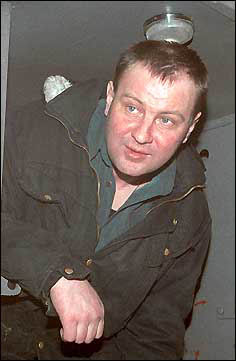The heirs of Budanov By Andrei Babitsky, special to Prague Watchdog
It is obvious that the motives for Colonel Budanov’s early release are legally questionable and morally preposterous. No sane, normal person living in Russia would want to see an unrepentant psychopathic murderer (and probably also rapist) walk free on the street among his fellow citizens. Nevertheless, because of the campaign that has been organized by the Chechen authorities, the focus of this story has changed, and the Budanov case has suddenly broadened in a topical way.
The sentence passed on the Russian army colonel was, of course, unduly lenient, and this has been repeatedly pointed out by human rights defenders and relatives of his victims. But if we are honest we will admit that against the backdrop of a huge number of similar crimes which have remained unpunished, the Budanov case looks like an exceptional instance – the accidental or deliberate sacrifice of a single criminal, while thousands of others who killed, tortured, and mocked enjoyed the protection of a State which has absolved them of responsibility on the grounds that they were taking part in military operations.
As a result, although Budanov has (for whatever reason) been made into a scapegoat, this in no way reduces the degree of his responsibility for the murder he committed. However, the situation itself may prompt a timely reflection on the fact that an enormous stratum of war crimes and crimes against humanity has been determinedly sheltered from justice, throwing to the surface a wretched figure who has been forced to take on his shoulders the entire weight of the Russian army’s criminal actions in Chechnya. While the selectivity with which the government has acted in this situation naturally gives us no reason to sympathize with Budanov, this is something that must be borne in mind if we are to understand the questions that need to be raised today.
The problem is that the condemnation of Budanov and other Russian officers who have accidentally received their “just deserts” does not relieve society of the essential task: that of returning, sooner or later, to an investigation of the past in order to identify and punish the criminals responsible for the killings, disappearances and torture. The attention human rights defenders are giving to Budanov’s early release is understandable: beyond any selective approach, they are simply assessing the circumstances of a specific criminal case. Their conclusions are purely professional – the court’s decision is a highly questionable one.
But the mass campaign of protest which has been organized in Chechnya completely reproduces the logic of the Kremlin's selective approach. From the government’s point of view, Budanov is a criminal. His early release may well have been authorized without the involvement or support of politicians at a federal level, and it does not alter its status. He is a man who has been convicted of murder, and will forever remain so.
On the other hand, the thousands of Russian army officers who have killed, tortured and raped are – by default – fully-fledged citizens who are safely protected from any criminal prosecution, and whose status is therefore intact. Kadyrov’s official human rights agency has violently protested against Budanov’s release, but it does not even plan to raise the issue of the legitimacy of the federal government’s approach. It merely insists that the Russian colonel should serve the term that was prescribed by the sentence of the court.
Neither Kadyrov nor even his human rights Ombudsman Nurdi Nukhazhiyev are in any position to declare the need for an investigation of the crimes of all the Budanovs who fought in Chechnya. For one thing, it would call into question the legitimacy of the military campaign for the pacification of the republic, a tenet that is a cornerstone of Putin's power. And for another (and this is more important), the Budanov case has not been forgotten. Kadyrov himself and his gang of many thousands are the Russian colonel’s talented and successful heirs, who have multiplied his glorious deeds many times and have achieved significant advances in the use of the most heinous methods of reprisal.
There is also a strong element of nationalism here. Kadyrov lives in the absolute certainty that he alone has been granted the right to punish or pardon the Chechens because they are a nation over which he has been given the right of ownership, either by the will of Allah or the will of Putin – which to him seem to be more or less the same thing. Only he and his bloodstained servants are authorized to spill Chechen blood, and this is an intimate process, one in which intervention by an ethnic Russian must be publicly labelled as interference in internal Chechen affairs. It is obvious that his attempts to thus play on the national feelings of his compatriots clash with the tacit denial of thousands of other crimes that have been covered up by the Kremlin. But this does not worry Kadyrov too much. Most probably he has never even noticed the contradiction.
The wretched, hounded killer who has now been so shamefully released will probably sink into an outer darkness so complete that no more will be heard of him for many a long year. But the other Budanovs – yesterday’s, with Russian names, and today’s, with Chechen ones – will not even dream of encountering a final retribution, either in this world or the next. And the weight of their crimes continues to form part of the moral fabric of the Russian state and society, and irreparably distorts our way of life.
The photograph is borrowed from the website of Novaya Gazeta. (Translation by DM) (P/T) RELATED ARTICLES:
· The Yuri Budanov case (Prague Watchdog, 8.1.2009)
DISCUSSION FORUM
|

